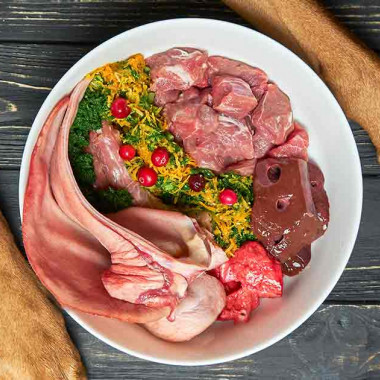Newborn puppies get all the necessary nutrients from their mother's milk during the first two weeks of their lives. However, situations may arise where there is a larger litter, the mother has little milk, rejects the puppies, or in the worst case, the mother dies. In such cases, it is essential for breeders to know how to best care for these small puppies.
Supplemental feeding with a large litter
With a large litter, there may not be enough mother's milk for all the puppies, or the stronger ones may push the weaker ones away from the milk. In such cases, it's important to supervise the nursing and alternate the puppies at the mother. If there isn't enough milk for all the newborn puppies and they need to be supplemented with formula, feed the stronger puppies first. This is because the weaker ones need the higher quality nutrition that only mother's milk can provide.
Supplemental feeding when there is not enough milk
If the mother has a standard-sized litter but still has insufficient or no milk, not only should the puppies be supplemented, but attention should be given to the mother as well. The mother should be in both good physical and mental condition during nursing, with plenty of nutritious food and increased fluid intake. Adding cow’s udder, dairy products, or even offering puppy formula to her diet can improve milk production. While waiting for this to happen, it's important to supplement the puppies with formula (ideally, each puppy should get some mother's milk if available, so allow them to nurse as much as possible before supplementing).
Artificial rearing of puppies
In cases where the mother rejects the newborn puppies, dies, or is otherwise unable to care for them, the breeder must take over this responsibility. This doesn't just involve feeding but also overall care. Newborn puppies are unable to regulate their body temperature or empty their bladders and bowels on their own, so this must be managed by the breeder. Another option is to find a lactating female dog among acquaintances willing to care for the puppies. This is the optimal solution but not always possible.
What must be provided to ensure the puppies thrive?
Maintain an environmental temperature between 28 - 30°C, gradually reducing it after the second week, and by the fourth week, 21°C is sufficient.
Help the puppies eliminate by stimulating them with a moistened cloth until they void.
Supplement them with high-quality formula (warmed to the puppies’ body temperature), using the correct bottle and nipple size, and always feed in an upright position.
Feeding intervals:
Up to 3 days: every 2 hours
Up to 10 days: every 3 hours
Up to 16 days: every 4 hours
From 17 days: every 5 hours
Whether puppies are nursing, supplemented, or being raised with formula, from the third week, BARF supplements can be introduced, such as finely ground meat (chicken, turkey, beef), finely grated carrot, goat’s milk, or plain yogurt (cow’s milk is not recommended due to common lactose intolerance in puppies).
As the puppies grow, their diet can be expanded to include more types of meat, fruits, and vegetables. From the fifth week, softer bones (like chicken necks or carcasses) can be introduced, initially ground or using pre-ground bone mixtures. Organs (stomachs, hearts, beef tripe) can also be added. Other types of organs can be introduced from the sixth week but only in small amounts.
For older puppies ready to go to their new homes, feeding portions can be determined using the article "How to Calculate a Feeding Portion for a 2-Month-Old Puppy."










